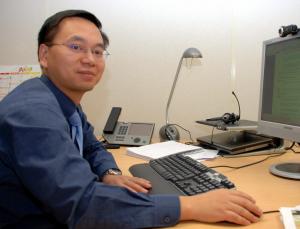Go between east and west
Starting off as a student at the Beijing Foreign Studies University, Mingxing Su soon became a diplomat for science and technology cooperation between east and west—a broker for science and technology projects on international scale.
After having passed several training programs on economic management and intellectual property right management in Korea and Singapore, Mingxing worked for the Department of International Cooperation of the Ministry of Science & Technology of China (MOST) with his initial portfolio covering science and technology exchange and cooperation programs between China and the United States. Then, in 2000, Mingxing himself packed the suitcase and travelled west, to Washington D.C., serving as Second Secretary in the Science & Technology Office of the Chinese Embassy. Four years later Mingxing boarded the plane back to Beijing to work as the Deputy Director of the Division of International Organizations and Conferences in the Department of International Cooperation of MOST.
At that time, the Director of that division was Luo Delong, now the Executive Deputy Director-General of the Chinese Domestic Agency, who had led the ITER negotiations between his country and other Parties since 2003. While Mr. Luo was charged to build up the ITER China office, the predecessor of the Chinese Domestic Agency, Mingxing was once more sent to the new world, France, after personal involvements in the process of the negotiations. He arrived in Cadarache in November 2006, just a few days prior to the signing of the ITER Agreement at the Elysee Palace in Paris.
At ITER Mingxing serves as the Administrative Officer in the Office of the Director General. His main job includes the organization of weekly Senior Management Meetings and Monthly Progress Report, the reviewing of the documents and contracts requiring Director-General approval, and the preparation of materials and presentations for meetings and visits, for example this week—a visit to the Lawrence Livermore Laboratory in the US.
Sometimes he also takes a seat on the plane with the Director-General for visits to far east. "Yes, life here at ITER is certainly different to what I have experienced before," says Mingxing. "But it is challenging. And I am very proud to be part of this great project!"
Mingxing and his family found a home in Manosque like all other Chinese staff, which he describes as "very convenient." Very convenient ... meaning that his four-year-old daughter Meiyun, "beautiful cloud" in Chinese, can easily attend kindergarten of the International School, where she is learning Chinese, French and her favorite subject—drawing.
Writing a portrait about a colleague, no matter how long you have been working with him, often ends with a little surprise. Which comes as no surprise! What do we know about the person sitting on the other side of the office wall except for his origin and his profession? The fact that Mingxing as a Chinese is good at playing ping-pong is not necessarily striking.
But Mingxing has yet another passion as a good amateur player in Go chess, a 3,000-year-old game popular mainly in the far east. In contrast to the common chess board, Go has a big board, battle fields, and simple yet unique rules. While humans have been defeated by computers playing traditional chess, even supercomputers like Deep Blue still have a long way to go to beat Go. Mingxing will be happy to explain why this is so.


